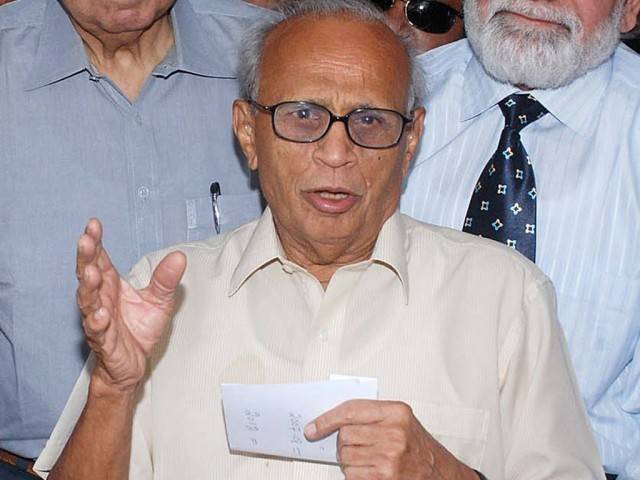ISLAMABAD - In an obliviously implied response to criticism concerning the ECP’s decision to make public the presidential election schedule, Chief Election Commissioner Fakhruddin G Ebrahim has justified the commission’s initiative terming it the ECP’s constitutional responsibility to oversee the presidential election.
“It is constitutional responsibility of the ECP to hold and conduct election to the office of the President of Pakistan,” a statement from the Election Commission of Pakistan quoted the CEC as saying on Wednesday.
Apparently, his reaction came against the backdrop of criticism from certain political parties, mostly from opposition, which question the timing of the ECP’s decision to announce the electoral schedule. Leader of Opposition in the National Assembly Syed Khursheed Shah had opposed this move on Wednesday while contending that electoral college for choosing the new president was ‘incomplete’ owing to next month’s by-elections on 42 general seats.
On the other hand, the CEC rejected Shah’s assertion and stated that the electoral college was complete and conducting by-elections on the said general seats was a routine matter. “This is not something new. By-elections are held on routine basis, which can’t affect something as important as electing a new president,” Ebrahim told this correspondent.
“In my opinion, the argument that electoral college is incomplete holds ground only when any parliamentary assembly is non-functional due to its dissolution or on any pretext or a huge number of electoral seats fall vacant. The assemblies are functional and legislators are performing their duties. The by-polls’ conduct on a few seats in all the five assemblies does not justify the contention that presidential schedule should not have been announced because electoral college was not in its full strength.”
Moreover, in his Wednesday statement, the CEC said that under the provisions of second schedule to the constitution, the election commission is required to announce the schedule for presidential election and conduct the election “so as to complete the whole process in relation thereto within the stipulated period.”
The press release added that for the purpose of holding presidential election, the chief election commissioner, in his capacity as returning officer, is also required to appoint presiding officers to preside over the meeting of the members of Majlis-e-Shoora (Parliament) as well as the meeting of the members of the provincial assemblies. Besides, the ECP is required to fix the date, time and place for depositing nomination papers, holding scrutiny, publishing the list of validly nominated candidates after withdrawals and conducting the poll, the statement furthered.
In another development, the ECP has appointed 20 high court judges as election tribunals for the disposal of appeals against the decisions of the returning officers for by-elections on 42 general seats scheduled on August 22. The ETs comprise of eight Lahore High Court judges, six judges from Peshawar High Court and three each from Sindh High Court and Balochistan High Court. The tribunals have been divided into four principal seats, each established in every province, and five benches, three of which are set up in Punjab and two in Khyber Pakhtunkhwa.
The ETs details are: Principal seat (LHC), Justice Sardar Tariq Masood and Justice Muhammad Farrukh Irfan Khan; Multan Bench (LHC), Justice Altaf Ibrahim Qureshi and Justice Amin-ud-Din Khan; Rawalpindi Bench (LHC), Justice Ijaz Ahmad and Justice Ibad-ur-Rehman Lodhi; Bhawalpur Bench (LHC) Justice Sardar Muhammad Shamim Khan and Justice Shezada Mazhar; Principal seat (PHC), Justice Mazhar Alam Miankhel and Justice Qaiser Rashid; PHC (Bannu Bench) Justice Rooh-ul-Amin Khan and Justice Syed Afsar Shah; Dera Ismail Khan Bench (PHC), Justice Abdul Latif Khan and Justice Lal Jan Khattak; Principal seat (SHC), Justice Faisal Arab, Justice Ghulam Sarwar Korai and Justice Naimatullah Phulpoto; Principal seat (BHC), Justice Muhammad Noor Meskanzai, Justice Naeem Akhtar Afghan and Justice Muhammad Hashim Khan Kakar.
Meanwhile, the ECP has said that the nomination forms for contesting election to the office of the president are available in the ECP Secretariat, Islamabad, as well as in the offices of the registrars of the high courts of the provinces concerned and the provincial election commissioners.
Friday, April 19, 2024
Presidential election ECP’s constitutional responsibility: CEC

Rashakai pSEZ to get Rs470.78m solar panels project
April 19, 2024
Dubai Underwater
April 19, 2024
X Debate Continues
April 19, 2024
Cartoon
April 19, 2024
The Escalating Nature of Threat
April 19, 2024
Hepatitis Challenge
April 18, 2024
IMF Predictions
April 18, 2024
Wheat War
April 18, 2024
Rail Revival
April 17, 2024
Addressing Climate Change
April 17, 2024
Justice denied
April 18, 2024
AI dilemmas unveiled
April 18, 2024
Tax tangle
April 18, 2024
Workforce inequality
April 17, 2024
New partnerships
April 17, 2024
ePaper - Nawaiwaqt
Advertisement
Nawaiwaqt Group | Copyright © 2024





